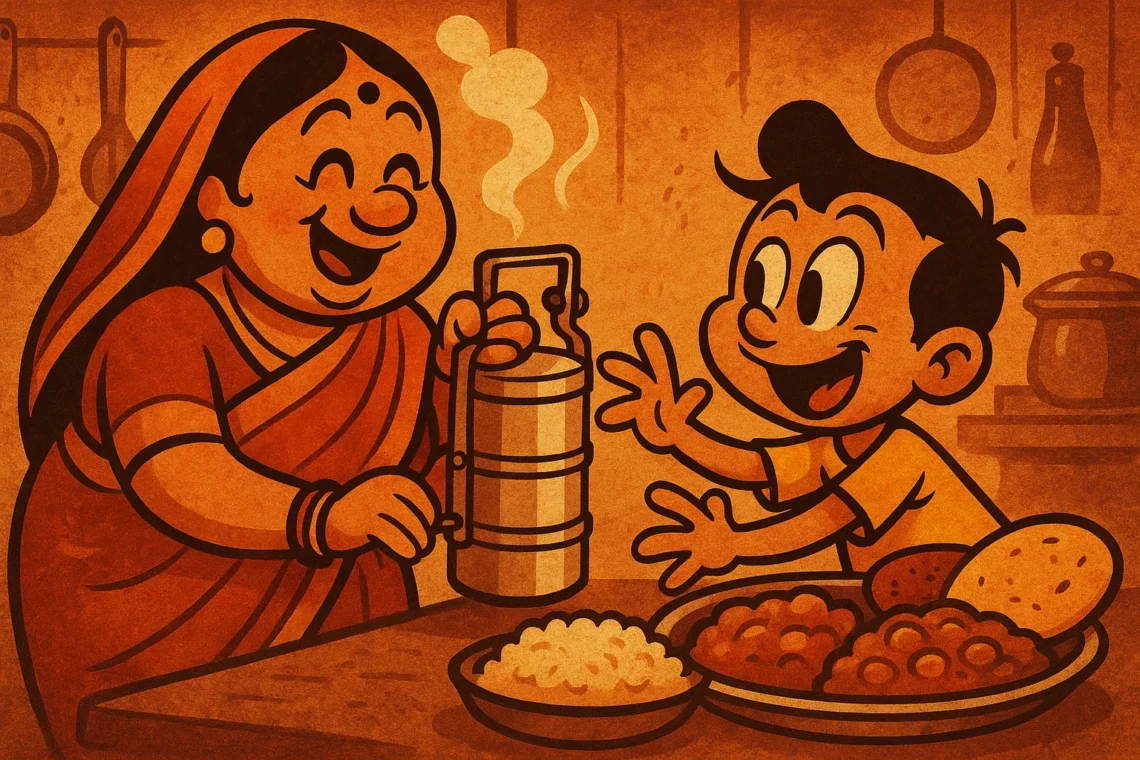Before there were meal preps and microwave-safe containers, there were tiffins. Stainless steel, stacked, slightly dented, always warm to the touch and somehow leaking even when tightly sealed. But no matter where I was — school desk, office canteen, college corridor — the moment I popped open that latch, a familiar cloud of spice, steam, and nostalgia would rise. That smell? That was home.
In Mumbai, where lunch breaks are short and the days are long, the tiffin is sacred. Not just the food, but the container itself. The old four-tier one my mother packed with the precision of an engineer. One tier for rice, one for dal, one for sabzi, and the smallest one always reserved for something magical — a sweet surprise or her trademark mango pickle, spicy enough to startle but addictive enough to finish. That little dabba always held more emotion than volume.
The Sound of a Packed Lunch
The mornings in our house had a rhythm: pressure cooker whistles, the flip of rotis on the tawa, and the gentle clink of steel lids being fitted into place. My mom packed lunch with the kind of care you don’t notice when you’re a kid. She’d fold rotis in soft cotton napkins, sneak in an extra spoon of sabzi because “You’ll be hungry after class,” and press the lid shut with her full palm like she was sealing in blessings.
I didn’t realize it then, but each layer of that tiffin was a message: eat well, take care, I’m with you. No notes, no dramatic goodbyes — just the scent of methi paratha and ajwain floating out when I cracked it open in the lunchroom. Home, in bite-sized portions.
The Vessels That Carried Love
Tiffins were never just containers. They were memory machines. My grandfather had one he took to the textile mill every day, wrapped in an old cloth bag tied with a knot only he could undo. It smelled faintly of his aftershave and sambhar. My father’s tiffin was simpler, more utilitarian, always packed just as he left for the 8:07 local train. And mine — my scratched-up, slightly wonky two-tier one from school — still lives somewhere at the back of a kitchen drawer, smelling faintly of childhood.
The actual food changed — aloo gobi in winter, bhindi in summer, rajma on Fridays — but the feeling never did. That moment of opening your lunch, surrounded by classmates doing the same, was a kind of collective exhale. It didn’t matter if you ate on a cracked desk or a marble bench — as long as you had your tiffin, you had your anchor.
Dabbawalas and the Architecture of Care
In Mumbai, tiffins don’t just stay within homes. They travel — by train, bike, foot — thanks to the legendary dabbawalas. Watching them sort and deliver thousands of tiffins every day with no tech, no delays, and near-zero errors is like watching a miracle. But at the heart of that system isn’t logistics. It’s love. It’s the idea that someone cooked for you at 6 AM, and someone else risked Mumbai traffic to make sure it reached you by 1 PM, still warm.
My office tiffin in Austin is less heroic. It’s microwaveable, BPA-free, and smells mostly like refrigerator. But once in a while, when I pack leftover dal and rice into an old stainless steel dabba I carried across continents, something shifts. I open it at lunch, and for a moment, I’m back in my school courtyard, sharing a slice of my mother’s world with friends who now live in a group chat.
The Scent of Familiarity
You can’t really describe the smell of your home’s food — it’s part masala, part memory. It clings to the steel walls of the dabba. It seeps into the cloth bag. It announces itself proudly wherever you open it — train compartments, exam halls, open-plan offices. Sometimes you feel self-conscious. Sometimes you feel proud. But mostly, you feel held.
Even now, if I walk past someone at lunch and catch a whiff of curry leaves in hot oil, or mustard seeds cracking in ghee, I pause. It’s not just hunger. It’s a memory trying to find its way back. A tiffin opened somewhere. A family somewhere else. A little piece of home that crossed time and traffic to reach you.
That’s what tiffins are. Not just vessels of food. But vessels of care, routine, culture — and the kind of love that doesn’t announce itself, but arrives right on time. Still warm.
Born in Mumbai, now stir-frying feelings in Texas. Writes about food, memory, and the messy magic in between — mostly to stay hungry, sometimes just to stay sane.












